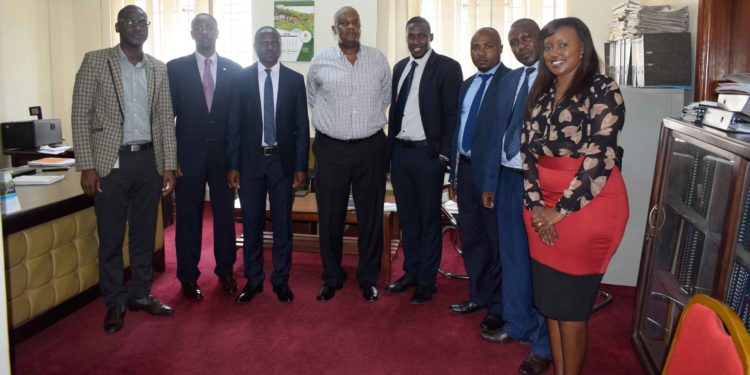Having successfully taken the draft bill on regulating customs agents and freight forwarders in Kenya through various public participation processes before it is submitted to government for enactment into law; focus has now shifted to Uganda as the region seeks to professionalize and regulate the industry.
The National Steering Committee together with the consultants, representatives from the Federation of East African Freight Forwarders Associations (FEAFFA) the project’s initiator, met with representatives of the Ministry of Works and Transport in Uganda to drum up support for the enactment of a legislation meant to regulate operations of customs agents and freight forwarders in the Republic of Uganda.
Uganda has already developed a draft document and it has now commenced the process of engaging with all the relevant stakeholders including government agencies for input to secure their support and receive crucial inputs on the proposed bill.
“We intend to engage all the industry stakeholders who among others include Uganda Freight Forwarders Association (UFFA) members, Uganda Clearing Industry and Freight Association (UCIFA), Federation of Uganda Customs Agents and Freight Forwarders (FUCAFF) Members, Uganda Revenue Authority (RRA), Ministry of Finance and Ministry of Trade,” said the acting executive director of FEAFFA Mr. Elias Baluku.
Kenya, Rwanda and Burundi have already made remarkable progress on the enactment of the law. Kenya has just concluded stakeholders’ validation meetings with key players in Nairobi and Mombasa who gave a nod to the proposed draft bill.
“The next level is to lobby line government ministries and members of parliament to support the bill once it is presented to parliament. We have received overwhelming support from the industry players, and we hope that the bill will as well get an easy sail once it gets to the floor of the house,” Roy Mwanthi said after the validation meeting in Nairobi.
In Rwanda, which piloted the project, the proposed draft is currently being reviewed by the Rwanda Utilities Regulatory Authority (RURA) before it is taken to parliament. Burundi has a draft document and the country is currently engaging stakeholders.
In the republic of Tanzania, the steering committee comprising of representatives from the Mainland and Zanzibar industry associations are finalizing the first draft for further engagements.
The journey to professionalize the freight forwarding industry has made remarkable success in the recent years. This initiative has been spearheaded by FEAFFA, the umbrella body representing freight forwarders in the East Africa, which has worked closely with other regional agencies and other development partners to professionalize the sector.
The new law will regulate individual practitioners, firms providing freight forwarding services, trainers and training institutions delivering freight forwarding courses.
Over the past years, the customs agents and freight forwarding industry in the EAC region has been plagued with many challenges including inefficiency, low levels of compliance with existing regulations, lack of ethical standards, integrity challenges and skills and competence gaps.
“The road to professionalism has made key milestones having trained over 6000 freight forwarders, deployed a code of conduct, standard of training conditions and a registration system and a continuing professional development (CPD) programme for industry professionals,” Baluku said.
Through collaboration with the East Africa Revenue Authorities and the EAC Directorates of Customs, FEAFFA developed the first ever practitioners’ training program for clearing agents and freight forwarders- the East Africa Customs and Freight Forwarding Practising Certificate (EACFFPC). Training was rolled out in 2007 and it is now a compulsory requirement for practitioners.
One of the key proposals in the Bill is the creation of a competent regulatory board in each partner state of the East Africa Community (EAC) to ensure registration and professional licensing of customs clearing and freight forwarding practitioners. Additionally, as part of the mandatory requirement for registration as a professional practitioner, the law intends to introduce the Continuing Professional Development (CPD). The CPD will keep members abreast with the industry dynamics and equip them with requisite competencies for the provision of competitive and high-end services.
“Several meetings recommended self-regulation and accreditation of the industry as the most suitable option. Development of the Model customs agents and freight forwarders management bill 2017 was considered important in order to guarantee uniformity and harmony of the resultant national laws given that clearing and forwarding agents operate across borders,” Baluku said.
Currently, the revenue authorities in East Africa are mandated under the East Africa Community Customs Management Act (EACCMA) to license agents and collect revenue on behalf of their respective governments.
Although the role of regulating clearing agents and revenue collection are clearly outlined under the East Africa Community Customs Management Act (EACCMA), other important aspect touching on the professional development of customs agents and freight forwarders in the region are not addressed under EACCMA.
The member countries are yet to develop regulations to operationalize the practicing of freight forwarders, exposing the industry to malpractices, corruption, lack of standards and compromised professionalism.
High competition in the market, according to drafters of the bill, leads to unfair pricing and practices which affect the integrity of both the customs and industry practitioners. For instance, some agents have been accused of undercutting when handling clearance of goods.
However, stakeholders have recommended their involvement in the design and delivery of these programmes and courses to ensure they address the needs of the industry.
For any feedback, contacts us via editorial@feaffa.com / info@feaffa.com; Mobile: +254703971679 / +254733780240





